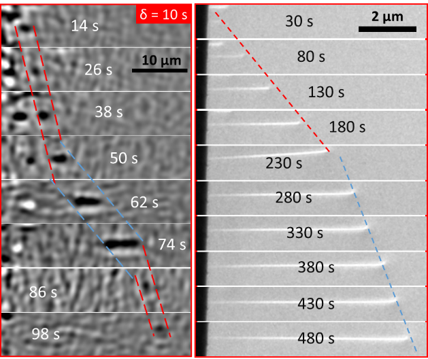Rechercher
Accueil > Formation > Propositions de stage
Research internship – 2024-2025 Master 2 level Deep-learning analysis of individual nano-objects in in situ microscopy videos
publié le
Research project
Automating recognition and tracking is key to high-throughput video analysis, which is crucial for understanding and modeling complex nanoscale processes. For instance, the electronic and optical properties of carbon nanotubes (CNTs), along with their unique structural characteristics, make them a highly promising material for device fabrication. However, their practical application still requires a deeper understanding of how growth selectivity depends on synthesis conditions. High-throughput in-situ measurements provide a way to study this, but the vast amount of generated data hinders efficient statistical analysis. Therefore, the aim of this project is to develop an AI-assisted system for extracting data from in-situ videos of carbon nanotube growth.
More specifically, the project will focus on developing an algorithm for the recognition and tracking of carbon nanotubes in different types of in-situ videos : optical microscopy videos from the University of Montpellier, and transmission electron microscopy videos from the University of Lyon (see video snapshots below). It will also involve the automated extraction of kinetic information, such as growth rate, lifetime, and nucleation times.
Our approach will build on our previous deep-learning developments (Mask R-CNN, see https://doi.org/10.48550/arXiv.2410.13594), but will use a more refined approach to segment tracking that will improve the previously built data treatment system. The M2 intern will be involved in the full AI development process, including dataset preparation and annotation, model selection and training, evaluation of the training process, and post-recognition data analysis. For physics students interested in optical methods, training in in situ observations of nanoscale processes using polarization microscopy (see https://doi.org/10.1021/acsnano.2c07388, https://doi.org/10.1021/acs.nanolett.1c03431) will also be provided.
The internship will be hosted at the Charles Coulomb Laboratory, a joint research center of the University of Montpellier and CNRS, which has extensive expertise in the in-situ observation of nanoscale processes. The M2 intern will be jointly trained and supervised by Vincent Jourdain from the University of Montpellier and Vladimir Pimonov from the University of Lyon.

Figure 1. Snapshots from homodyne microscopy (left) and ETEM (right) in-situ videos.
Sought profile
We are looking for a Master’s student in computer science or physics. A strong interest in computer vision and deep learning methods is essential. Proficiency in Python (including libraries such as matplotlib, numpy, and pandas) is required. Familiarity with object-oriented programming, lambda expressions, and the PyTorch library is desirable but not mandatory.
Forcandidates with a physics background, an interest in optical methods is important. We strongly encourage candidates who demonstrate strong interest for numerical analysis of research data, personal motivation, and good communication skills in English to apply.
Application date : from now and until selection of the candidate
Starting date : between January 2025 and March 2025
Internship duration : 5-6 months
Supervisors :
Vincent Jourdain
Vladimir Pimonov
Website of the Charles Coulomb Laboratory
Webpage of the University of Montpellier
Application details
The candidate must send :
- a personalized motivation letter detailing his/her interest for the project and his/her aptitudes forleading the proposed research,
- a detailed CV describing his/her past research achievements,
- the contact details of 1-2 reference persons.
Incomplete applications will not be considered.








